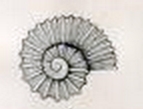Liotella rotula facts for kids
Quick facts for kids Liotella rotula |
|
|---|---|
 |
|
| Original drawing of a shell of Liotella rotula | |
| Scientific classification | |
| Synonyms | |
|
The Liotella rotula is a very tiny sea snail. It's a type of snail that lives in the ocean, belonging to the mollusc group. This small creature is part of the family called Skeneidae.
What Does Liotella rotula Look Like?
This tiny shell is only about 1 millimeter (mm) tall and 1.7 mm wide. That's smaller than a grain of rice! It has a thin, white, see-through shell.
The shell is shaped like a flat disc, almost like a tiny frisbee. It has a wide, open space in the center of its base, which is called an umbilicus (like a belly button).
The top part of the shell, called the spire, is quite flat. It has 4 turns, or 'whorls.' The first two tiny turns, called the protoconch, are smooth and slightly raised.
The shell has cool patterns! It's decorated with many small ridges that go outwards like spokes on a wheel. These are called radial riblets. It also has tiny spiral lines between these ridges. The round, raised spiral ridges stand out. They get closer together as they reach the shell's opening.
The largest part of the shell, called the body whorl, has 17 of these radial ridges. It's round at its edge and curved at the bottom. The lines where the whorls join, called sutures, are pressed in.
The shell's opening, or aperture, is round. The thin edge around the opening is continuous and gets thicker where the last radial ridge ends. The inner lip of the opening, called the columella, is curved and not folded back. The wide umbilicus lets you see all the whorls inside.
Where Does Liotella rotula Live?
This ocean snail is found only in New Zealand. This means it is endemic to that country.
See also

- In Spanish: Liotella rotula para niños

